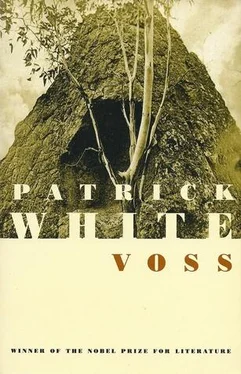Aghast that she should harbour unkind thoughts, Mrs Radclyffe was relieved the following moment to receive an onslaught of younger children, who came flinging down the path, released from Latin, or French, or scales, to bury in her soft amplitude their hard inky little bodies.
How she loved that which had been torn out of her. Such was her appetite for her children, she frequently had to remind herself that her husband was their father, and entitled to his share.
Now several of those children were kicking and shouting.
‘We tasted the sillabub,’ they cried.
‘May I stay up tonight, Mamma?’
‘I will stay up.’
‘Who said?’
‘I did.’
‘If you do not stop kicking me, Tom!’
‘That is enough,’ said Mrs Radclyffe.
Only Laura, the eldest, who had accompanied the children, not as a sister, but as a condescending deity, preserved a godlike silence. Beneath her coils of grown-up hair she made a mystery out of almost everything.
‘Everyone will stay up,’ Mrs Radclyffe announced, in the accents of a just and rational mother. ‘Not the babies, of course, and some longer than others, according to ages. You must agree that that would only be right.”
Whether they shared her opinion or not, all were agreed that their mother did conceive the most lovely ideas, and this could be one of them.
Mrs Radclyffe had determined to give a party to which she would invite only those people she wished to have. So constituted that she was always persuaded to see the best in human nature, it promised to be a gathering of fairly ill-assorted guests, rich with poor, which is daring enough, past with present, which can be more distasteful, age with youth, in which soil can germinate rare seeds of bitterness and cruelty. Yet, Mrs Radclyffe was resolved to dare. Nor had she devised any set plan of entertainment, but, owing again to her soft and trustful character, would leave it to the guests to amuse themselves, to illuminate by conversation, or to console with music, to answer questions on slips of paper, to eat and drink without shame, to flirt, or to wander solitary in the cool of the garden, which is, for some individuals, the only solution of a party.
Of the whole pantomime, Mrs Radclyffe had always loved best the transformation scene, and here she was, staging one of her own. As night fell and the moon rose behind the net of trees, the woman’s hands would have turned hot and childish but for the clattering of cold rings.
‘Belle!’ her husband was calling. ‘Belle!’ Through the expectant house. ‘Your dog has relieved himself on my boot.’
‘Oh, Tom! It could be any one of a variety of liquids. Or did you see him with your own eyes?’
‘It can only be Pug,’ Mr Radclyffe had decided. ‘I am convinced of that.’
He always was.
‘Oh, dear!’ said his wife, but was concerned about other matters.
‘I will not be answerable for the disaster you insist upon courting,’ said Tom Radclyffe, as they were standing together, in anticipation, under the globes of blue gas.
‘You will not be required to,’ Belle replied, raising her chin slightly.
Not that she had any great confidence in her own powers, but did believe in allowing a situation to arrange itself.
Mr Radclyffe could not but smile, both for his superior knowledge and for her dazzling face. He was very pleased with his wife, though even more with his own perspicacity in choosing her.
She, who all her life had reflected the sun, was the colour of moonlight on this occasion. Thanks to various devices of an ingenious dressmaker, including the judicious use of mother o’ pearl, she was shimmering like blue water. The moon itself could have rained upon her hair, in a brief shower of recognition, and as she floated through the altered room, a big, conquered, white rose dropped its tribute of petals at her feet.
Night had indeed, taken possession. The solid scents of jasmine and pittosporum that were pressing through the open window had drugged the youngest children to the extent that they were clutching drowsily at their mother’s hoops to stay their inevitable fall.
‘You must leave us now,’ she said softly, loosening the tight grip of their hands.
Then she kissed them, in order, before they were carried out. Very small children, she had decided, would only have lain about in heaps and run the risk of being trodden on.
Soon after this, the guests began to arrive.
There was no lack of rank and fashion, it appeared, and all were vociferous in their admiration of Mrs Radclyffe’s candid beauty, while hastening to detect its blemishes. For instance, her throat, of which other mothers had always predicted the worst, had thickened undeniably. If the world of fashion overlooked the generosity of her glance, it was because such virtues embarrassed it, even destroyed the illusion of its power. Belle, in her simplicity, secretly admired those who were light and meretricious, imagining they had found the key to some freedom she had never yet experienced, nor would, because she did not dare. This diffidence, far from diminishing her beauty, enhanced it in the eyes of the elegant by restoring the strength they had been in danger of losing. They would declare:
‘My dear, there is none lovelier than Belle Radclyffe, although she is not what she was as a bride. Do you remember?’
Here would follow noises suggestive of severe colic.
‘Yet, one might say she is improved, in a certain sense. Such spirituality !’
More noises, less physical, but more mysterious.
‘Many a hard outline would be softened if its owner possessed but half of Belle’s charm.’
Here someone was demolished.
‘But would you describe Mrs Radclyffe as an entertaining companion?’
‘Entertaining? It rather depends upon what you wish the word to imply. I do know others who might be described as more entertaining than Mrs Radclyffe . But no woman, of course, is endowed with all the qualities. And Belle is so sweet.’
‘And dresses so beautifully. If not after the highest fashion.’
‘More of an individual style.’
‘I must say it does require considerable courage to appear with such an ornament in the hair.’
‘The moonstones.’
‘The moonstones? Effie! The Moon!’
‘Sshhh!’
‘Effie, do you not realize that Belle Radclyffe has come as the Moon?’
A thin laughter continued to uncoil.
Guests were circling and wondering which others they should avoid. Only their iridescence mingled. The men, in black, were clinging together for protection.
‘Mrs de Courcy, it was so kind of you to come,’ Mrs Radclyffe said, advancing.
Learning phrases from the more accomplished, she did not learn them well enough and spoke them with a hesitation, which did charm momentarily even the crueller women.
‘You know that I would die for you, Belle. I would die for you alone,’ said old Effie de Courcy, who was doing something to her chignon and looking round.
It was doubtful to which of the gentlemen that lady would offer the cold remains of her looks, but to one she must, out of habit.
Now the insignificant figures of several poor or grotesque individuals, known to most of the company, began unaccountably to make their appearance. There was a Dr Bass. Nobody would have guessed that the worthy physician had any other function beyond the prescription of pills. There was Topp, the music-master, who had been coming to everybody’s house for years, to the exasperation of everybody’s girls, and naturally Topp had always been allowed a slice of madeira cake and a glass of port, but in isolation, of course. There was that old Miss Hollier, a fright in pink net, who could recite pedigrees by the yard, and from whom one escaped only by buying a lotion for removing freckles. The presence of such persons provided the first unmistakable evidence that something was amiss. A Member of the Legislative Assembly was frowning, and several ladies were look-at their long kid gloves and giving them a tweak. Then it was noticed that children also were present, both of the house, and other young people, lumpy girls, and youths at the age of down and pimples. Strangest of all, Willie Pringle had arrived. Certainly Willie had grown up, which nobody had ever expected. That he had remained ridiculous, nobody was surprised. On returning from France, where he had lived for some years in a state of obscure morality, he had painted, and was still painting, a collection of what no one could describe as pictures; it was a relief to be able to admire the gold frames.
Читать дальше












